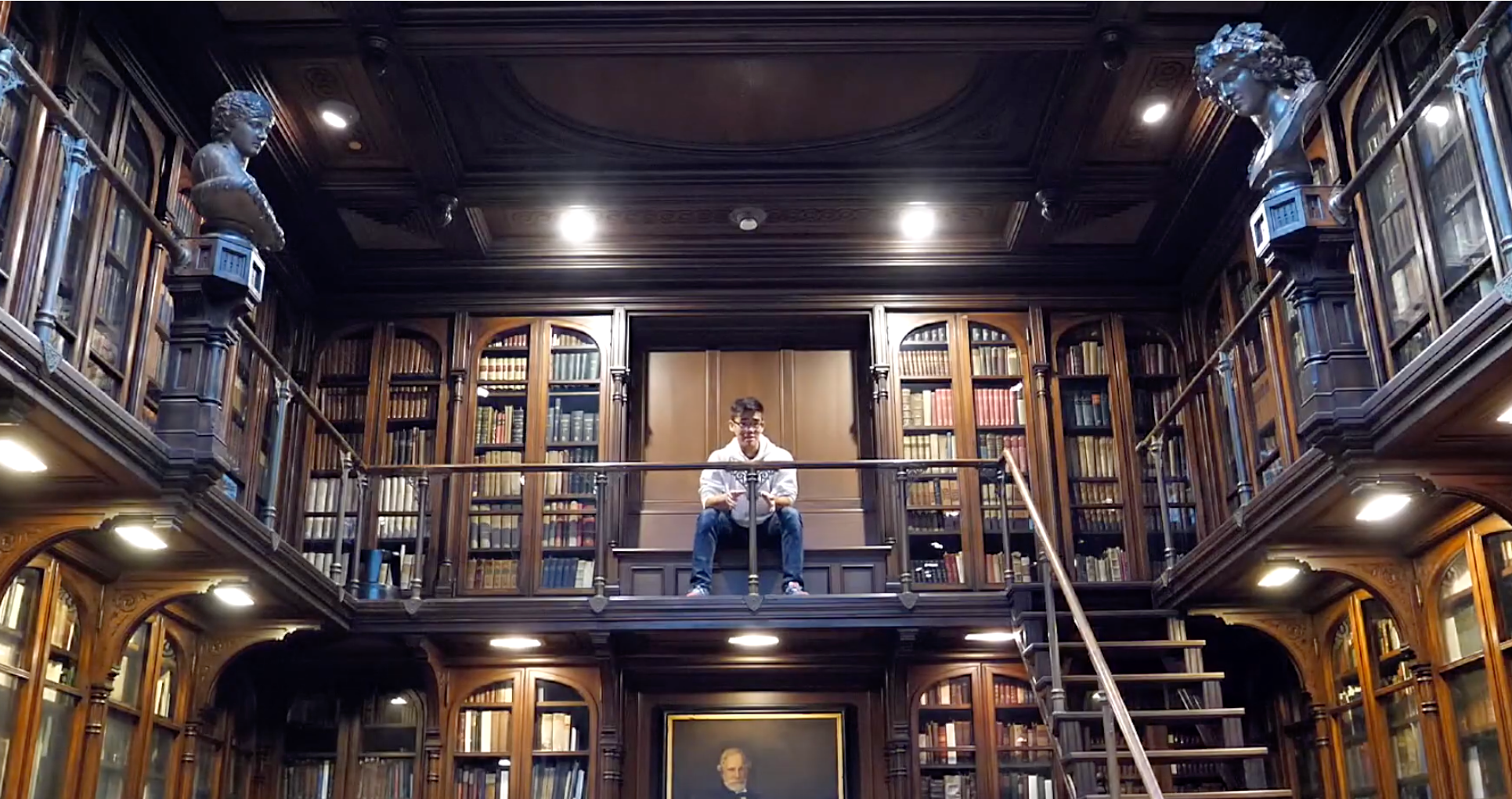Student Spotlight: Jiaqi Song

Jiaqi Song was born on one continent (Asia, in Beijing), grew up on another (Europe, in Rome), and now attends college on a third (North America, in Philadelphia). Fittingly enough, he’s a second-year student in Wharton’s Huntsman Program in International Studies and Business.
In addition to being a globetrotter, Song is also a videographer, bibliophile, and — despite himself — a singer (see interview below). He recently produced The BEST thing about College (UPenn) using equipment borrowed from the Vitale Digital Media Lab. The video chronicles a day in Song’s life as a Penn student and includes an early-morning trip to the gym, a meal at Chipotle, and a cameo by his classmate’s service dog.
The video also features an extended visit to the Van Pelt-Dietrich Library Center. Song meets with John Pollack in the Henry Charles Lea Library to peruse a selection of the Kislak Center’s rare holdings: a 16th-century edition of Dante’s De la vulgari eloquentia (“On eloquence in the vernacular”) and Convivio (“the banquet”); the original manuscript of String Quartet No. 3 by Bela Bartok; and a first folio edition of Shakespeare’s complete works (printed in 1623). En route to his next class, Song stops by the Albrecht Music Library to show viewers a cabinet that was once owned by Ludwig van Beethoven and to thank head of the Music Library Liza Vick for her assistance with the video.
We recently spoke with Song about videography, books, and his nascent career as a musician.
How did you come to videography as a hobby?
I discovered my passion for videography last summer. My mom had bought a nice camera for my birthday the year before, but I hadn’t used it. Many of my friends were posting videos of their reflections on freshman year, so I dug my camera out of the storage room and made a similar video.
Writing the script, shooting, and editing took about 20 hours in total. If I had been working on an essay, I would have procrastinated and taken forever to complete it; however, the video took only two days to complete and I didn’t feel tired at all. When I uploaded it to Youtube, many of my friends gave me good feedback. I enjoyed every aspect of the process and decided to make more.
I’m particularly proud of the video Speaking Italian to Strangers in China, because before shooting I was afraid that people were going to be annoyed with me, given that Chinese are generally very reserved. But filming turned out to be enjoyable. What’s more, I was contacted by a record label because their scout saw me sing during the filming!
You were contacted by a record label!
To be totally honest, I was taken aback. I don’t think that I sing all that well so I didn’t take the scout seriously. But then she kept interrupting and wouldn’t let me continue to film until I said yes. So we exchanged contact information and she messaged me a few days later to invite me to a final round audition. Unfortunately, by then I had left Beijing and gone back to Rome. I agreed, however, to attend a try-out next summer when I’m back in Beijing.
In addition to the Vitale Media Lab, The BEST thing about college spotlights both the Henry Charles Lea Library and a cabinet housed within the Music Library that was once owned by Ludwig van Beethoven. How did you find out about them?
I took an Italian literature course in my freshman year with Dr. Eva del Soldato. Every few weeks Dr. del Soldato would take our class to the Lea Library and we would have a chance to read through printed books mentioned by our textbook, some of which dated back to as early as the fifteenth century.
And last semester, I took a course in music history with Lloyd Frank, who mentioned Beethoven’s cabinet in class. I admire both teachers so much, and am constantly amazed by how much they both know about history.
What was your favorite academic project for which you’ve used library books?
That would have to be Comparative Capitalist Systems paper from last year, in which I explored the economic discrepancy between Northern and Southern Italian economics around the time of unification. I used two physical books — Storia Della Questione Meridionale by Salvatore Francesco Romano and The Italian Risorgimento by Martin Clark — as well as numerous papers from Penn’s databases. I was surprised to discover that Penn had so many niche books, especially the Italian one I used, which I couldn’t find on most Italian sites.
What extra-curricular book are you reading right now?
I’m currently reading Sapiens: A Brief History of Humankind by Yuval Noah Harari, a book that I bought a few weeks back when I forced myself to stop using my phone for a week. It talks about human history from a scientific perspective and sheds light on how we became what we are today.
Why did you decide to give up your phone?
I get addicted to things very easily. Back in middle school, I spent a considerable amount of time on video games. In college, the situation was repeating itself: I was spending, on average, more than four hours per day on my phone. I realized that I could be doing so many more valuable things with that time, and I therefore decided to try quitting my phone for a week. Now, I’m able to limit my phone use to less than two hours per day.
Many people have a certain habit they resort to when they’re feeling bored. In my case it was using my phone. However, once I gave up my phone, I didn’t know how to make use of all of that extra time. I decided to buy a book my friend had suggested — and it worked!
Date
December 5, 2019
